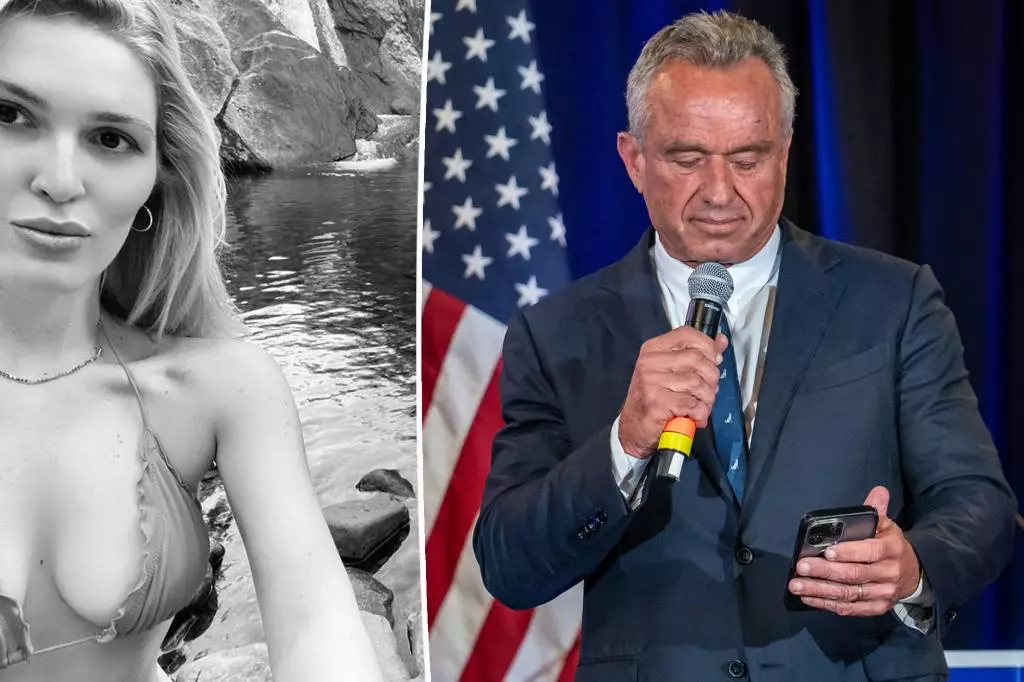In a striking tale that combines elements of passion, betrayal, and political intrigue, the involved parties emerge not only as figures of public interest but also as representatives of a complex interplay between personal ambition and professional ethics. The alleged affair between journalist Olivia Nuzzi and Robert F. Kennedy Jr. uncovers a labyrinth of feelings and choices that impact their lives and the lives of those around them. This incident serves as a reminder of how the convergence of personal and public personas can lead to a spiral of complications, especially in the realm of politics and journalism.
At the heart of this situation is the allure of celebrity, particularly in political spheres where name recognition can attract both admiration and controversy. Kennedy, the son of a politically storied family, finds himself in a complicated web as he navigates his own political ambitions alongside personal entanglements. His marriage to actress Cheryl Hines, compounded by his exploratory candidacy, positions him in media and public scrutiny, transforming his every interaction into a potential headline.
Initially, Nuzzi’s reaction to Kennedy was one of aversion after his awkward advance. However, as they began exchanging messages, the dynamic shifted remarkably. Sources suggest Kennedy employed what is often referred to as “love bombing,” a tactic commonly associated with manipulative relationships, to win Nuzzi’s affection. This psychological manipulation raises questions about the nature of their attraction. Nuzzi’s admission of her double life—maintaining a relationship with Kennedy while being engaged to another—illustrates how compelling emotional ties can blind individuals to their existing commitments.
As their digital relationship deepened, friends noted a discernible change in Nuzzi’s persona. Transformations in one’s character, particularly under romantic influence, are not unusual, but in this case, they signify a more profound internal conflict between personal integrity and romantic urges. For Nuzzi, the stakes escalated; a chance encounter in a secluded area during an interview raised the tension, demonstrating how the intersection of professional duty and personal desire can yield both electrifying moments and deep discomfort.
The revelation of their relationship sent ripples through both participants’ lives. Nuzzi faced scrutiny over her conflicting commitments, leading to a suspension from her position at New York Magazine. While the publication insists that there was no evidence of unethical reporting or bias, the decision to investigate highlights the media’s need to maintain credibility in the face of sensational allegations. The implications for Nuzzi’s career are severe, particularly considering the competitive nature of political reporting and the potential impact of personal entanglements on journalistic integrity.
Conversely, Kennedy’s posturing in denying and downplaying the connection reflects a calculated effort to safeguard his public image. The divergence between his public and private personas raises ethical dilemmas. On one hand, his denial allows him to maintain his standing in the political arena; on the other, it reveals a dissonance between what is exhibited and what is reality. By implying he only met Nuzzi once, Kennedy attempts to distance himself from any implications of impropriety, although sources suggest their relationship was far more involved.
The media’s role in examining the affair exposes a dual narrative: Nuzzi as a flawed yet ambitious journalist and Kennedy as a politically potent figure consumed by romantic entanglement. The sensational nature of their relationship draws media attention that could overshadow journalistic integrity and political discourse. As such, their personal lives risk becoming a distraction from crucial societal issues, a phenomenon not uncommon in the intersection of politics and the press.
The fallout illustrates how public figures, especially those involved in politics, often exist under a microscope, where their personal lives can have profound implications on their careers. Both Kennedy and Nuzzi embody the complexities of modern media interactions. The electric nature of their relationship, punctuated by FaceTime encounters and emotional intensity, encapsulates a broader narrative about love, power, and the personal sacrifices made in the pursuit of both.
In parsing through the layers of this intricate affair, we glean insights not only into the individuals involved but also the mechanisms by which power dynamics operate within media and politics. The emotional intricacies shed light on how personal choices can sometimes blur professional lines, culminating in public scrutiny and potential ruin. As the affair continues to unfold, it serves as a cautionary tale about the entanglements that can arise in the corridors of power and the inevitable consequences that follow. Ultimately, Kennedy and Nuzzi’s tale is a testament to the chaos that accompanies passion when it crosses the boundaries of propriety and professional decorum.

